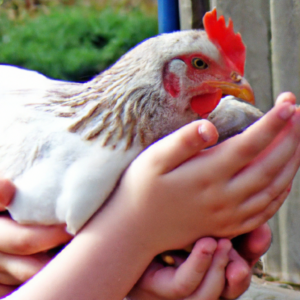
As the winter months approach, it’s essential to ensure that the environment for your chickens remains enriching and comfortable. During this time, chickens need extra care and consideration to thrive, despite the harsh weather conditions. By implementing a few simple strategies, such as providing warm bedding, increasing their feed, and offering engaging activities, you can create a winter haven that not only keeps your chickens content but also supports their overall well-being. In this article, we will explore some practical tips and ideas to help you enrich the environment for your feathery friends during the colder months.

Maintaining Temperature
Insulating the coop
To maintain a comfortable temperature for your chickens during the winter months, it is crucial to insulate their coop properly. Insulation helps to trap heat and prevent drafts, ensuring that your feathered friends stay warm. You can use materials such as foam boards, straw bales, or even recycled denim insulation to insulate the walls and ceiling of the coop. Make sure to seal any gaps or cracks to minimize heat loss.
Providing heat sources
In extremely cold weather, additional heat sources can be essential for keeping your chickens warm. You can use heat lamps, radiant heaters, or heated perches to provide warmth in the coop. It is important to position these heat sources carefully, ensuring they are securely mounted and placed away from flammable materials. Monitor the temperature regularly to avoid excessive heat or fire hazards.
Monitoring temperature levels
Regularly monitoring the temperature levels inside the coop is essential to ensure your chickens’ comfort. Invest in a reliable thermometer to keep track of the temperature and make adjustments accordingly. The ideal temperature for most chicken breeds ranges between 40 to 60 degrees Fahrenheit. Remember that proper ventilation is necessary to regulate temperature and reduce humidity buildup.
Ensuring Proper Ventilation
Keeping ventilation openings clear
Proper ventilation is essential to maintain a healthy living environment for your chickens during the winter. Ensure that any ventilation openings, such as windows or vents, are clear of any obstructions. Clearing away any ice, snow, or debris will allow fresh air to circulate while preventing the buildup of harmful toxins like ammonia.
Preventing drafts
While ventilation is crucial, it is equally important to prevent drafts that can chill your chickens. Inspect the coop for any cracks or gaps that may allow cold air to enter. Seal these openings with caulking or weatherstripping to create a draft-free environment. Remember to strike a balance between ventilation and drafts to maintain optimal conditions.
Limiting moisture buildup
During the winter, moisture buildup in the coop can lead to frostbite and respiratory issues in your chickens. Proper ventilation helps to reduce humidity levels and prevent condensation. Additionally, using absorbent bedding materials like straw or wood shavings can help absorb excess moisture. Regularly remove damp bedding to maintain a dry and healthy environment for your chickens.

Creating Ample Space
Allowing for free movement
Providing ample space for your chickens to move freely is crucial for their overall well-being, especially during the winter months when they may spend more time indoors. Ensure that the coop and run have enough space for your chickens to exercise and stretch their wings. Overcrowding can lead to stress, aggression, and increased susceptibility to disease.
Providing separate areas for different activities
Creating separate areas within the coop for different activities allows your chickens to engage in natural behaviors. Include areas for roosting, nesting, feeding, and dust bathing. This separation helps to maintain order and prevents overcrowding in a single area. Offering a variety of perches, nesting boxes, and feeding stations will enrich their environment and keep them active and healthy during the winter.
Preventing overcrowding
Overcrowding in a chicken coop can have detrimental effects on the health and well-being of your flock. Ensure that you have a suitable space-to-chicken ratio, allowing each bird enough room to comfortably move, roost, and engage in natural behaviors. Overcrowding can lead to stress, reduced egg production, and an increased risk of diseases. Assess your coop’s capacity and adjust the flock size accordingly.
Promoting Social Interaction
Encouraging flock bonding
Chickens are social animals, and promoting flock bonding is essential for their mental well-being. Provide spaces within the coop where chickens can gather and interact with each other. This socialization reduces stress and boredom, making for happier and healthier chickens during the winter months. Consider incorporating perches or roosting bars where they can spend time together and strengthen their social bonds.
Introducing new chickens carefully
If you plan to introduce new chickens to your existing flock during the winter, it is important to do so carefully. Quarantine new birds for a few weeks before introducing them to prevent the spread of diseases. Introduce them gradually, starting with supervised interactions through wire mesh to allow the chickens to become familiar with each other while preventing any aggressive behavior. Monitoring their interactions is critical to maintaining a harmonious flock.
Providing suitable roosting space
Proper roosting space is essential for chickens to rest comfortably and securely. Ensure that your coop has enough perches that are well-spaced to accommodate all the chickens. The perches should be wide enough for the chickens to have a firm grip and elevated off the ground to keep them away from drafty areas. Providing suitable roosting space will promote restful sleep and prevent any potential injuries.

Offering a Varied Diet
Adjusting feed quantity
During the winter months, chickens require more energy to generate body heat and sustain themselves. Adjust their feed quantities accordingly to meet their increased energy requirements. Consider increasing their portions by a small percentage to ensure they have enough fuel to stay warm. Observe their eating habits and body condition to make necessary adjustments over time.
Including fiber-rich foods
Offering fiber-rich foods is vital for your chickens’ digestive health, especially during the winter when they may have limited access to fresh forage. Provide high-fiber treats such as leafy greens, cabbage, or hay. These foods keep their digestive system functioning properly and prevent issues like crop impaction. Remember to introduce new foods gradually and provide a balanced diet to meet their nutritional needs.
Providing fresh greens and vegetables
Although fresh greens and vegetables may be scarce during the winter, it is essential to supplement your chickens’ diet with these nutritious options. Consider growing sprouted grains or providing kitchen scraps like carrot tops, kale, or broccoli as a source of fresh greens. These foods provide essential vitamins and minerals and aid in maintaining a balanced diet for your flock.
Ensuring Access to Clean Water
Using insulated water containers
Access to clean water is crucial for your chickens’ overall health and well-being during the winter months. Use insulated water containers to prevent freezing and ensure that your flock has a constant supply of fresh, unfrozen water. Insulated containers help to maintain the water temperature, preventing dehydration and ensuring optimal hydration for your chickens.
Preventing freezing of water
In colder climates, water can quickly freeze, leaving your chickens without a water source. Prevent the freezing of water by using heated waterers or adding insulating materials like foam sleeves or even old socks to your water containers. Regularly check the water to ensure it remains liquid and replenish it if necessary. Remember to position the waterers away from drafty areas to prevent freezing.
Checking water quality
Winter weather can sometimes create unfavorable conditions, leading to water contamination. Regularly check the water quality to ensure it remains clean and free from debris, ice, or mold. Remove any ice or debris that may have accumulated in the water containers and clean them regularly. Providing clean water ensures that your chickens stay healthy and hydrated throughout the winter.
Maintaining Good Hygiene
Regularly cleaning the coop
Maintaining good hygiene in the coop is essential for preventing the buildup of bacteria, parasites, and unwanted odors. Regularly clean the coop by removing soiled bedding, droppings, and any other debris. Use a safe and effective disinfectant to clean the surfaces, ensuring that it is safe for your chickens. Proper hygiene practices help minimize the risk of diseases and keep your chickens healthy.
Using suitable bedding material
Choosing suitable bedding material is crucial for maintaining cleanliness and comfort in the coop. Materials like straw, wood shavings, or shredded paper provide insulation, absorb moisture, and control odors. Regularly inspect the bedding and replace it if it becomes damp or soiled. Clean and dry bedding promotes good respiratory health and provides a cozy environment for your chickens.
Preventing mites and lice
Keeping your chickens free from external parasites like mites and lice is paramount for their well-being. Regularly inspect your chickens for any signs of infestation, such as feather loss or excessive scratching. Use appropriate pest control methods, such as diatomaceous earth or poultry dust, to prevent and treat infestations. Maintaining good hygiene in the coop and regular health checks can help prevent these pests from becoming a problem.
Providing Entertainment
Using boredom-busting toys
Chickens can become bored during the winter months when they are confined to the coop. Providing them with boredom-busting toys can help keep them entertained and mentally stimulated. Hang up toys such as plastic chains, mirrors, or treat-dispensing balls for them to peck at and explore. These toys can also help reduce aggression and feather pecking among the flock.
Hanging treat holders for pecking
Hanging treat holders in the coop can provide additional stimulation for your chickens. Fill them with nutritious treats like mealworms, corn, or vegetable scraps. As chickens peck at the treat holders, they are rewarded with small treats, engaging their natural foraging instincts and keeping them entertained. This simple addition can make a significant difference in their overall well-being.
Creating dust bath areas
Dust bathing is an essential behavior for chickens to keep their feathers clean and free from parasites. Create designated dust bath areas within the coop by providing a shallow container filled with dry dusting materials such as sand, wood ash, or diatomaceous earth. Your chickens will instinctively use these areas for grooming, reducing stress and maintaining good feather and skin health during the winter.
Protecting from Predators
Reinforcing coop security
Protecting your flock from predators is crucial, especially during the winter when other food sources may be scarce. Regularly inspect the coop for any weak spots or openings that could allow predators to enter. Reinforce the coop’s structure and repair any damage to keep your chickens safe. Ensure that doors, windows, and vents are securely locked or covered with sturdy wire mesh to deter predators.
Installing predator-proof fencing
Installing predator-proof fencing around the coop and the run can provide an extra layer of protection for your chickens. Use hardware cloth or welded wire fencing with small openings to prevent predators from squeezing through. Bury the fencing several inches below the ground to deter burrowing predators. Regularly inspect the fencing for any signs of damage and promptly repair any breaches.
Employing deterrents
Using deterrents can help deter predators from targeting your chickens. Consider installing motion-activated lights or sound devices near the coop to startle predators and discourage their presence. Additionally, using natural deterrents like predator urine or strategically placing decoy predators, such as owls or scarecrows, can help keep unwanted visitors at bay. Rotating deterrent methods can also enhance their effectiveness.
Supporting Natural Daylight
Maximizing exposure to sunlight
Access to natural daylight is essential for chickens’ well-being and overall health. Maximize their exposure to sunlight during the winter by orienting the coop windows to capture the most sunlight. Trim any overhanging branches or vegetation that may block sunlight from entering the coop. Allowing chickens to bask in natural sunlight promotes vitamin D synthesis and regulates their internal clock.
Ensuring adequate lighting in the coop
In addition to natural daylight, providing adequate artificial lighting in the coop can help maintain regular egg production during the winter. Install overhead lights with timers to simulate a consistent day length. The recommended light schedule is 14 to 16 hours of light and 8 to 10 hours of darkness. Proper lighting helps regulate their reproductive cycles and supports optimal egg laying throughout the winter months.
Managing artificial light
If you choose to use artificial lighting in the coop, it is essential to manage it properly. Avoid sudden changes in lighting as it can disrupt your chickens’ natural circadian rhythm. Gradually adjust the lighting schedule, extending or reducing the hours of light gradually over several days. Monitor your flock’s behavior and egg production to ensure they are adapting well to the artificial light.







